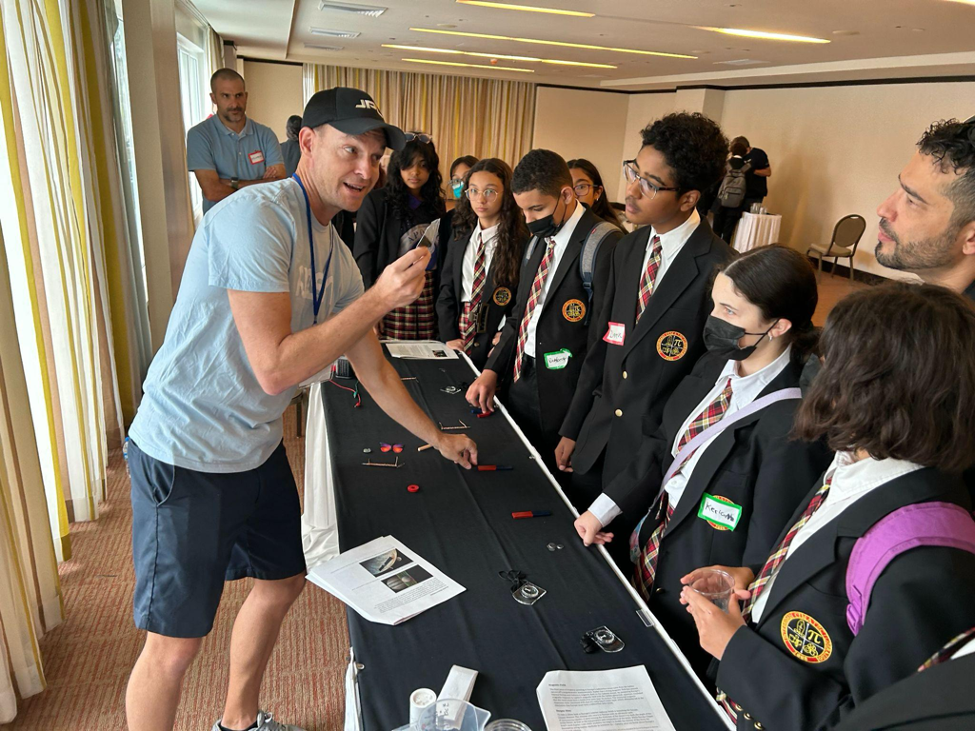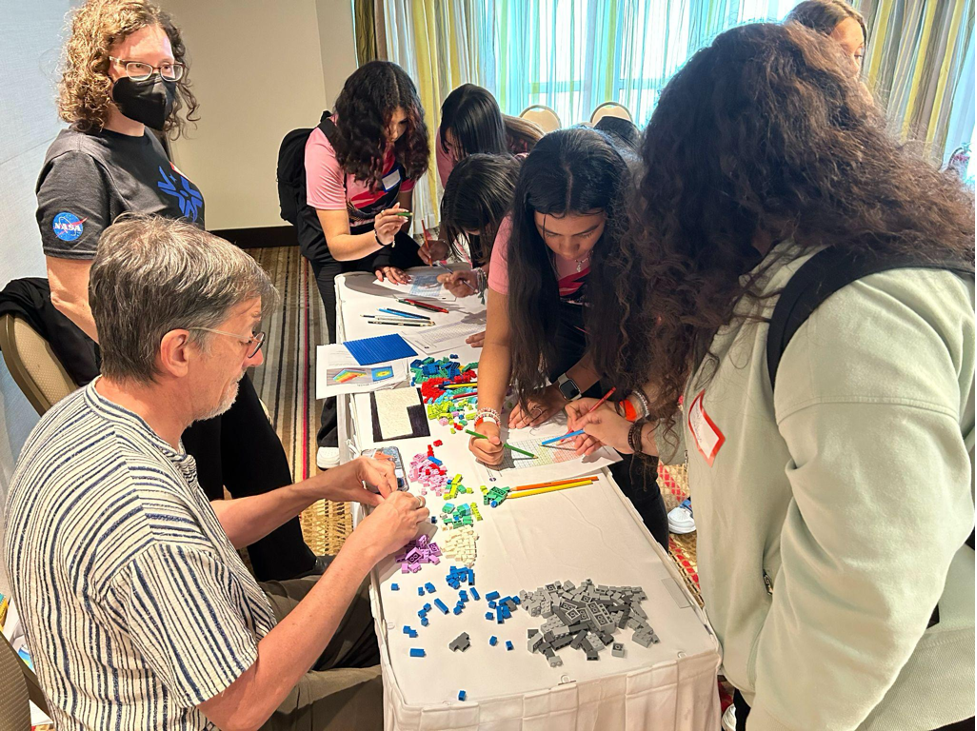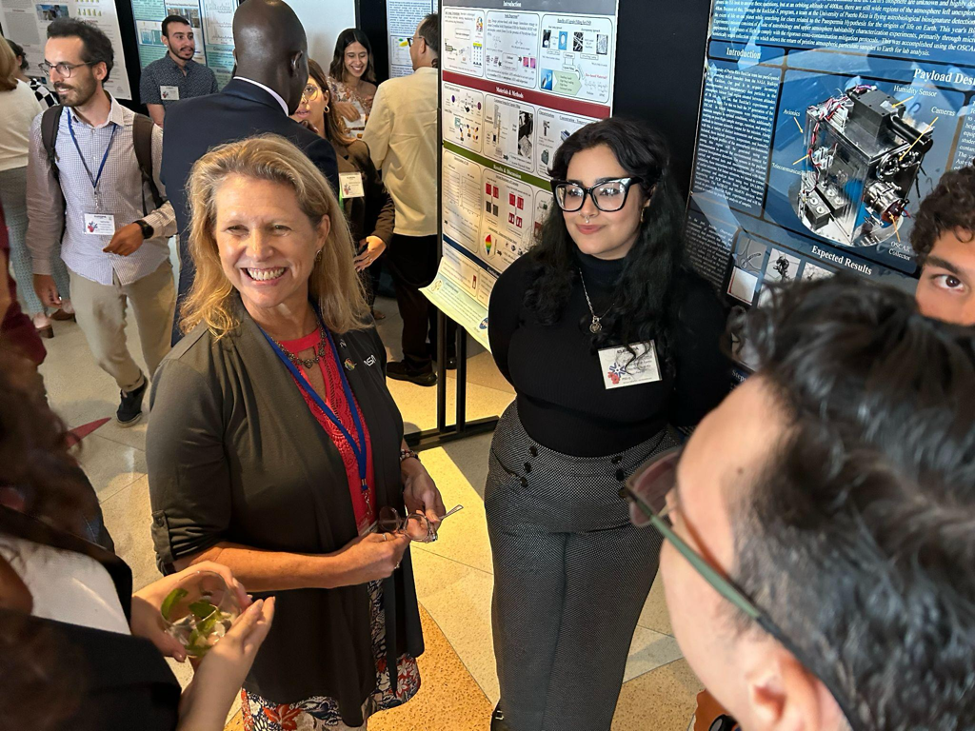Leveraging science team meetings to build connections with local communities: Europa Clipper y la Universidad de Puerto Rico
- 1Jet Propulsion Laboratory, California Institute of Technology
- 2Johns Hopkins Univ. Applied Physics Lab., LLC (United States)
- 3Universidad de Puerto Rico, San Juan, Puerto Rico, USA
In November 2023, the Europa Clipper science team held their group meeting in San Juan, Puerto Rico, chosen in part because of the existing partnership with University of Puerto Rico (UPR) and Here2Observe (H2O) program [1, 2]. Leveraging this opportunity, several moments were dedicated to interact with the broadest audience possible around bilingual events in English and Spanish (when possible). Overall, these activities required 56 volunteers and reached over 1500 people.
Why include education activities in a science team meeting?
The prime objective of science team meetings is to share updates on mission and science topics and encourage collaborations. However, leveraging this concentration of scientists and engineers in one location can be a great tool to build connections with local communities all over the country, especially underserved communities. NASA missions are a great vector to engage the public, inspire the next generation, and help provide a sense of ownership of these publicly funded projects to a broader audience. It is also a cost, carbon and time efficient way to connect with the community.
Secondary school students: hands-on activities
15 local schools traveled to the conference where they engaged with different hands-on activities modeling complex concepts in an easily-understood way led by Clipper team members. All activities were aligned with Next Generation Science Standards [4], relevant to their curriculum and easily adaptable to different age groups. Four activities were selected from JPL’s Education Office for their relevance to Europa:
- Solar system scroll [5]: comprehending distances in the solar system
- Ocean worlds density [6]: playing with the mass and density of known elements to predict Europa’s interior layers
- Ocean worlds magnetism [7]: exploring the relationship between magnetism and electricity to model how scientists discovered Europa’s salty ocean
- Mapping alien worlds [8]: build a planetary surface from simulated radar measurements using colored building blocks
Such an event is scalable to the number of volunteers and type of venue available. Here, we had a high engagement of science team members which allowed us to maximize the impact to the extent the local infrastructure allowed.

Fig. 1: Ocean worlds magnetism in action.

Fig. 2: Mapping alien worlds in action.
University students: Poster session and panel discussion
Europa Clipper sponsored a poster session for 105 university students which followed the model of a professional science conference. They presented their work to Clipper team members, as well as representatives of NASA’s Science Mission Directorate’s Planetary Science Division (PSD), giving plenty of opportunities for small group discussions about science and career.
The session was accompanied by a panel discussion with Lori Glaze, PSD director, Bonnie Buratti, Deputy Project Scientist on Europa Clipper, and UPR professors Abel Mendez, Raiza Quintero, Carmen Pantoja, Mayra Santos, and Desiree Cotto-Figueroa, who spoke about research opportunities for students at UPR.

Fig. 3: UPR student presenting their work to scientists of the Europa Clipper mission.

Fig. 4: UPR students presenting their work to Lori Glaze, director of PSD.
Elementary schools: Livestream event in Spanish
The reach and accessibility of in-person events is always limited. To expand beyond that, a live stream broadcast in Spanish was organized for elementary schools across Puerto Rico - 82 schools signed up. An interview-style conversation between Brandon Rodriguez, Education Specialist at JPL, and Tim Larson, Deputy Project Manager for Europa Clipper was followed by a Q&A session. Participating classrooms also received a packet of information and activities to continue the experience beyond the stream.
Public: Star Party in a unique location
Finally, a public event was organized in collaboration with local Solar System Ambassadors, the science museum EcoExploratorio and Sociedad de Astronomía de Puerto Rico, at the National Historic Site Castillo San Felipe del Morro in Old San Juan. Sadly, the weather did not cooperate and we had to contend with the rain. Under a tent, the audience attended a series of presentations by Europa Clipper’s leadership and our hosts. The highlight was a reading of Ada Limon’s “Praise Of Mystery” poem in English by Roque Raquel Salas Rivera followed by their own translation in Spanish.

Fig. 5: Roque Raquel Salas Rivera at star party.
Lessons learned
Including outreach and education activities during the Europa Clipper science team meeting was very successful. It deepened the team’s relationship with Puerto Rico and demonstrated the commitment of the mission to our local partners with whom we built these events in the context of a broader and consistent relationship. Team members found these interactions both fun and meaningful, and a large majority want to continue to include significant outreach activities in future science team meetings.
We also learned valuable lessons:
- More Spanish speakers needed: despite most students in Puerto Rico studying English in schools, we found varying levels of English fluency. The assistance of our few Spanish-speaking team members and Observers was essential and greatly appreciated.
- Audience knowledge shouldn’t be assumed: e.g. the solar system scroll activity assumes the audience knows the names of the planets and their order. We adjusted in real time by providing images of all the planets with their names in English and Spanish.
- Navigating technical difficulties: many schools were unable to log in to the live stream event, but a recording was shared with students the same day.
- Contingencies for outdoor events: we can’t control the weather!
The presence of the science team meeting of NASA’s latest flagship mission in Puerto Rico was significant and highly covered by the local media. These events showed how much the public is enthusiastic for their space missions, and science in general, when we meet them where they are.
Acknowledgements
This work was supported by the Europa Clipper Project. We acknowledge the contributions of the Planetary ReaCH group; the work and participation of the Clipper H2O current students and alumni as well as all the Europa Clipper team members who volunteered their time, energy and passion for these activities; and the support and participation of the JPL Education Office and NASA’s Science Mission Directorate’s Planetary Science Division.
References:
[1] https://science.nasa.gov/planetary-science/programs/here-to-observe-h2o/
[2] Klima et al. EPSC 2024
[3] https://www.lpi.usra.edu/planetary-reach/
[4] https://www.nextgenscience.org/
[5] https://www.jpl.nasa.gov/edu/teach/activity/solar-system-scroll/
[6] https://www.jpl.nasa.gov/edu/teach/activity/discovering-alien-oceans-density/
[7] https://www.jpl.nasa.gov/edu/teach/activity/discovering-alien-oceans-magnetism/
[8] https://www.jpl.nasa.gov/edu/teach/activity/mapping-alien-worlds/
How to cite: Belgacem, I., Phillips, C. B., Matiella Novak, A., Quinones Velazquez, L., Rodriguez, B., Mcintyre, O., and Pappalardo, R.: Leveraging science team meetings to build connections with local communities: Europa Clipper y la Universidad de Puerto Rico, Europlanet Science Congress 2024, Berlin, Germany, 8–13 Sep 2024, EPSC2024-278, https://doi.org/10.5194/epsc2024-278, 2024.